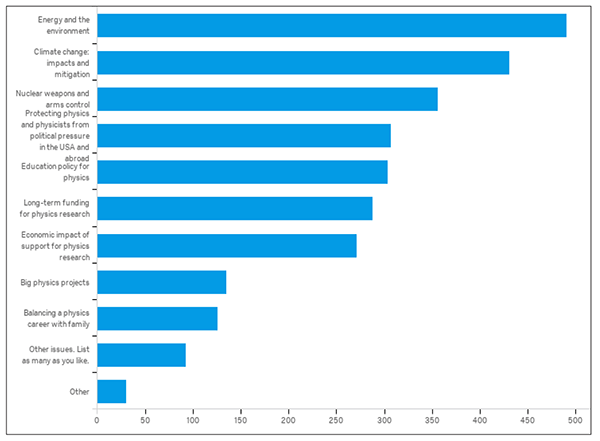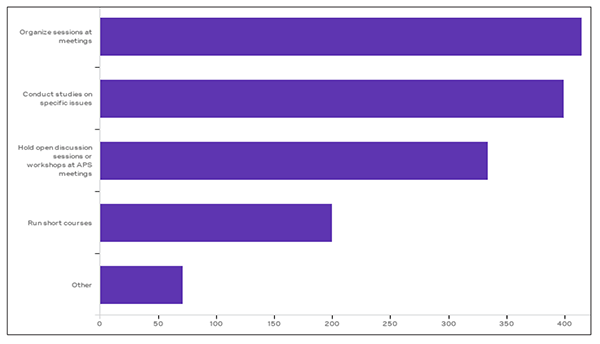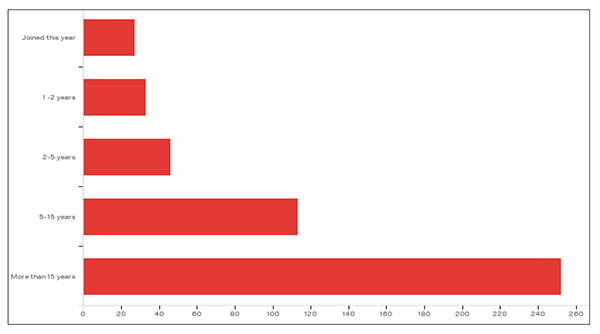Report on Survey of Members of the FPS
Ruth Howes, Chair, FPS and Bev Hartline, Vice Chair, FPS
Six hundred and eleven members of the Forum on Physics and Society responded to the survey over the summer to let us know their priorities for FPS engagement and action. The purpose of the survey was to determine with what issues members thought FPS should be involved; what methods the forum should use to approach these issues; and how individual members would like to be involved. By asking what members think, we hope to establish an agenda for the Forum that will both interest members and advance the interests of physics and the physics community in the future.
What Did Forum Members Say?
Energy and the environment, climate change, and nuclear weapons and arms control were the three topics of interest to the most members. Among “other” issues that respondents identified, beyond the choices in the question, surprisingly, the two most often mentioned areas were educating the public about physics and increasing the diversity of physicists. Other issues cited were education at all levels of schooling including college, jobs, funding for physics, and population control, as well as de-politicization and internationalization of physics, climate and energy issues, media and cyber security, the role of physics in managing technological change and the relationship of physics to humanities, social sciences and religion.
The second question on the survey asked what actions FPS should take on these issues. The top two choices, in a near tie — both supported by about two-thirds of respondents — were to organize sessions at APS meetings and to conduct issue-specific studies. Among the “other actions” recommended, the most frequently cited activity was interacting to inform elected officials, which is currently the job of the APS Office of Public Affairs. Perhaps the message for FPS is to work more closely with other entities of APS. Several members suggested that Forum could make better use of media — especially to inform members, host discussions, or reach out to the public. The FPS Newsletter received strong support and a suggestion that it should feature occasional topical theme issues. These ideas will be discussed by the executive committee and at the upcoming 2017 business meeting (PLEASE COME), and they can lead to some concrete projects involving a larger cross section of members. As these initiatives take shape, we invite members to participate and even lead those where they are passionate.
Conclusion
The final question on the survey asked for additional thoughts on how the Forum can engage more members and have a greater impact. Responses were varied widely and were certainly one of the most useful parts of the survey responses. Members warned against liberal bias and concentrating solely on nuclear issues. They asked for more opportunities for early-career physicists, and some advocated scholarships or career fairs. Many respondents suggested more effective use of social media and the main-line media to foster discussion and disseminate information from sessions and discussions to physicists and the public. Several members suggested collaborations with a wide variety of APS units and committees, including POPA, FIP, FED, the Government Affairs Office, and other APS departments, and with organizations similar to FPS within other scientific professional societies, such as the ACS and UCS. We especially want to shout out our favorite suggestion: “Speak Louder.”
In summary, the survey confirms the commitment of many FPS many members to put their energies to work bringing creative ideas to live that benefit physics and society and the interface between the two. More than 100 people provided contact information and expressed an interest in getting personally involved. They will hear from us individually. We on the Executive Committee thank all respondents for sharing their ideas, and we pledge to follow up with near-term actions we can take to engage the members and put at least some of these ideas into practice. The first action is this article in the FPS Newsletter! Watch for more.
About the Respondents
About 10% of FPS members took the time during summer to complete the survey. Not everyone answered all questions or provided demographic information. The participants included at least 44 foreign members; at least 110 members from the eastern U.S. at least 77 Westerners, at least 62 Midwesterners, and 11 members whose response defied simple geographic classification — clearly a broad geographic spectrum of members. Survey participants also represented a range of membership tenure — including those quite new to the forum (~10%). We were pleased that so many loyal, long-standing, and committed forum members responded.
The distribution of respondents by employment sector is shown below with a large number of responses from retirees. As with many questions on the survey, quite interesting responses came from the short answers: 2 students, 3 grad students, 2 tutors, 4 consultants, a writer, a business person, someone who works both as a teacher and for a non-profit, 2 people who are self-employed, and a job seeker. Clearly FPS members are in a broad range of non-traditional career paths, as well as traditional ones.
We look forward to working with you to pursue many of these ideas, and we look forward to your involvement to make these initiatives successful.
With what policy issues should FPS be involved and where is it likely to have an impact?

What specific actions should FPS take on these issues to inform the physics community and others and to promote discussion?

How long have you been a member of the FPS?

These contributions have not been peer-refereed. They represent solely the view(s) of the author(s) and not necessarily the view of APS.
